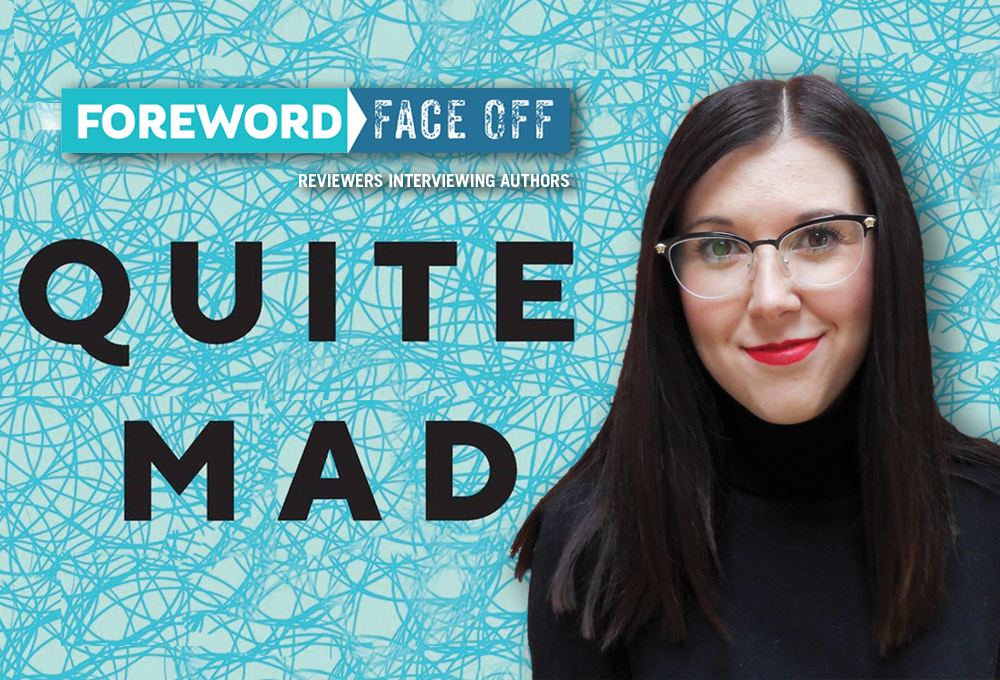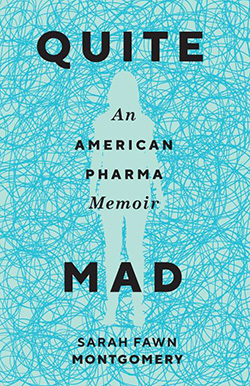Reviewer Hilary Daninhirsch Makes Peace with “Quite Mad” Author, Sarah Fawn Montgomery

Illness. Sickness. Disease.
Some of them catch you. Others you’re born with (thanks, Mom and Dad). The worst are untreatable and deadly. A few can be managed with meds but can’t be cured.
That last category is the common state of affairs for mental illness sufferers, but the word “managed” is wildly misleading, because meds for the brain are potent and always come with troubling side effects, in addition to the stigma associated with mental illness. Indeed, until quite recently, diseases like schizophrenia dare not speak their name (thanks, Oscar) in polite society, such was the supposed embarrassment to friends and family.
Let’s talk about it, damnit.

Meet Sarah Fawn Montgomery, a mental health sufferer willing to step center stage to discuss her tribulations in her book, Quite Mad: An American Pharma Memoir—which earned a starred review from Hilary Daninhirsch, one of Foreword’s most skilled reviewers. We were awed at Sarah Fawn’s courage and writing chops, and with an assist from Ohio State University Press’s imprint, Mad Creek Books, we set Hilary and Sarah Fawn up for this extraordinary email conversation.
In your memoir, you are candid about your somewhat volatile family upbringing and dynamics and their frustrating way of dealing with your mental illness diagnoses. How has your family reacted to the publication of your memoir? Has it brought you closer or did it widen the gap?
Writing about loved ones is always difficult, and a large family—I’m one of eight mostly adopted siblings ranging in age from fifty to fifteen—certainly complicates the pressure to be respectful and to get things right. Because I was writing about our collective history, which included sensitive material, I was careful to fact check with my family while writing. I also spoke to each of my siblings about what was in the book, asking their permission a few times to disclose especially personal information. Though my parents and siblings have yet to read the book, and will likely not, the process has allowed us to speak more openly about mental illness, which many of my family members share, so, as a result, putting the story on the page has been a way to counter what for many years felt like imposed silence.
Do you hope that your book will either help effectuate change or at least spark a conversation about the over-prescribing of medications that are targeted for mental illness?
If anything, I hope it compels us to complicate the ways we treat mental illness, which is multifaceted and dynamic, stemming from the unique intersections of experience, genetics, and identity, and which requires the intersection of various treatments. Our culture often frames medication as a cure, when for some, medication can cause a range of unpleasant side effects, fail to work, relieve only a portion of symptoms, or lose effectiveness over time. Medications are certainly not “bad”—they allow millions of Americans to live symptom free and meaningful lives, or to even live at all—but we must think in more nuanced ways about mental illness and the ways we treat patients. By focusing solely on prescriptions, we overlook other underlying causes of psychiatric distress, and by framing drugs as a clear solution, we place a lot of pressure on patients to “recover,” when we know mental illness is not that simple and that many patients may experience symptoms throughout their lifetimes, regardless of medication. My hope is that Quite Mad gets us talking about various mental illnesses, which have a range of symptoms, and thus treatments, and encourages patients and physicians to diversify care.
In the book, you say that your husband, who has been a rock of support for you, also carries a mental illness diagnosis. How do you think your marriage is able to not only survive but thrive when both partners grapple with mental illness? Or do you feel that in some ways it promotes a deeper level of understanding?
Mental illness can be incredibly isolating, especially when folks around you don’t understand—or in many cases believe—your mental and physical symptoms and pain. Having a partner who understands what it is like to live with mental illness is a comfort, for I rarely have to explain let alone justify my symptoms. I am encouraged to live honestly and openly rather than try and conceal what for others is so stigmatized, and I have the support system I need to minimize my symptoms rather than one that insists I must “get rid of” illnesses beyond my control. Because my partner is also mentally ill, there is no pressure to perform “normally,” and I feel a sense of ease, which is what all of us want from our relationships, regardless of mental illness. As you mention, it can certainly be a challenge—my husband has bipolar disorder, while I have severe anxiety, OCD, and PTSD—but our acceptance and understanding of one another’s experience allows us to foster the kind of lifestyle each of us needs in order to be our best.
In addition, having a mentally ill husband, as well as mentally ill family members and friends, also reminds me how deserving we are of love. There’s a common misconception that folks with mental illnesses are somehow a burden to those around us, but having a rich community of mentally ill folks around me who struggle but also thrive, reinforces how common mental illness is, and reminds me, especially in difficult times, that we are capable and deserving of support.
In your book you describe episodes of anxiety, obsessive-compulsive disorder, and PTSD with raw honesty. Was the writing process a difficult one? Did it trigger any anxious feelings or was it cathartic to write about? Did it energize you in some ways?
It was incredibly difficult, in part because I had to relive painful moments in order to accurately write about them, and in part because I was putting my most flawed, imperfect self on the page, when a lot of my experience with mental illness had been about concealing it from others. Writing a memoir required a lot of vulnerability—and anxiety is already such a vulnerable space—but it also helped me to understand myself and my illness in new ways. I had to think about my family and my past quite a bit, and writing helped me to articulate a lot of what we weren’t allowed to talk about during my adolescence. It also allowed me to discuss things like trauma, the frustration of being a patient, and medical sexism—all of which are often silenced—so while it was challenging, it also felt like a powerful coming to voice or reclamation.
Quite Mad is so personal but, at the same time, it was extensively researched. You’re also a published poet. Which genre of writing do you prefer, both as a writer, and as a reader, and why?
I love the way research (in any genre) can transform us with history, science, and strange tidbits about foxes or starfish, the history of mapmaking, or various drug therapies. Most of my writing is inspired by learning something new, and the research and writing become a continuation of that discovery. I enjoy writing in multiple genres because it gives me a wider range of craft choices and perspectives from which to consider subjects. Plus, writing both nonfiction and poetry allows me to switch back and forth between projects—I’m currently working on a new book of nonfiction and a new book of poetry—and I love this movement and energy. As a reader, however, I prefer poetry, especially recently because so many timely collections have been published. There is something intimate and urgent about poetry, and the act of reading out loud, which I always do with poetry, is transformative, the words becoming a part of your breath and body.
What do you want readers to take away from your story?
Much of the book asks us to reevaluate our medical treatment, questioning the ways current attitudes towards mental illness impacts patients, the care they receive, and what we believe to be true about mental illness and health. I hope readers, especially those who have experienced mental illness, recognize themselves on the page and feel seen. I don’t want my story to be considered extraordinary, but rather as an urgent normal—according to the National Institute of Mental Health, 1 in 5 Americans has a mental illness. So many of us are told that there is something wrong with the ways we perceive the world, and we are shamed for speaking up, or blamed for not being able to “control” our mental health, but we need not feel alone—ashamed or alone.
Hilary Daninhirsch
